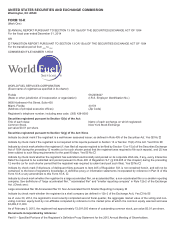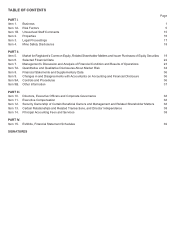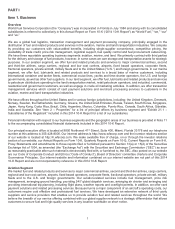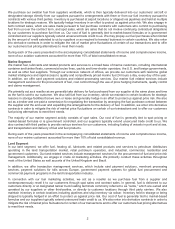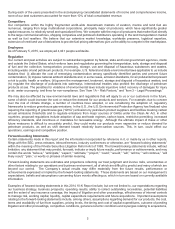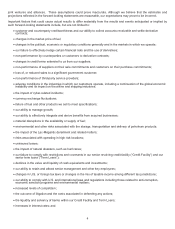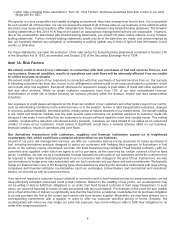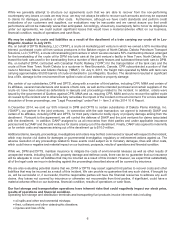World Fuel Services 2014 Annual Report Download - page 14
Download and view the complete annual report
Please find page 14 of the 2014 World Fuel Services annual report below. You can navigate through the pages in the report by either clicking on the pages listed below, or by using the keyword search tool below to find specific information within the annual report.9
and obligations under the agreement, under applicable foreign laws, and enforcing an agreement in a foreign jurisdiction.
Any significant liability in excess of any applicable insurance coverage could have a material adverse effect on our business,
financial condition, results of operations and cash flows.
We also use third parties to provide various services to our customers, including into plane fueling at airports, fueling of
vessels in port and at sea and delivering land based fuel. The failure of these third parties to perform these services in
accordance with contractual terms for any reason, such as their inability to supply specified fuel or an interruption of their
business because of weather, environmental or labor difficulties or political unrest, could affect our relationships with our
customers and subject us to claims and other liabilities that could have a material adverse effect on our business, financial
condition, results of operations and cash flows.
Adverse conditions in the aviation, marine and land transportation industries may have a material adverse effect
on our business.
Our business is focused on the marketing of fuel and other related products and services to the aviation, marine and land
transportation industries, which are generally affected by economic cycles. Therefore, weak economic conditions can have
a negative impact on the business of our customers which may, in turn, have an adverse effect on our business. In addition,
any political instability, natural disasters and other weather-related events, terrorist activity or military action that disrupts
shipping, flight operations or land transportation will adversely affect our customers and may reduce the demand for our
products and services. Our business could also be adversely affected by increased merger activity in the aviation, marine
or land transportation industries, which may reduce the number of customers that purchase our products and services, as
well as the prices we are able to charge for such products and services.
In addition, the aviation, marine and land transportation industries are subject to continuing changes in laws and regulations,
including environmental regulations mandating or incentivizing alternative energy sources or attempting to control or limit
emissions and pollution. For example, recent amendments to the International Convention for the Prevention of Pollution from
Ships, or MARPOL, established a phased reduction of the sulfur content in fuel oil and allows for stricter sulfur limits in
designated emission control areas. Further changes in laws and regulations applicable to international and national maritime
trade are expected over the coming years. Complying with these and other laws and regulations may require capital
expenditures by our customers or otherwise increase our customers’ operating costs, which could in turn, reduce the demand
for our products and services. Although the ultimate impact of any regulations is difficult to predict accurately, they could have
a material adverse effect on our business or on the businesses of our customers.
We are exposed to various risks in connection with our use of derivatives which could have a material adverse
effect on our results of operations.
We enter into financial derivative contracts in order to mitigate the risk of market price fluctuations in fuel products we sell, to
offer our customers fuel pricing alternatives to meet their needs and to mitigate the risk of fluctuations in foreign currency
exchange rates. However, our efforts to hedge our exposure to fuel price and exchange rate fluctuations could be ineffective
in certain instances. For example, we hedge jet fuel prices with derivatives tied to other petroleum products that often bear
some historical correlation to aviation jet fuel (e.g. heating oil in the United States or gasoil in Europe or Asia). If the price of
aviation jet fuel and the price of any such products experience divergence in correlation, then it is more likely that our attempts
to mitigate price risk associated with our aviation business would not be effective. For purposes of hedging, neither heating oil
nor gasoil is a perfect substitute for aviation jet fuel and short term significant pricing differences may occur. There may be
times where the change in the price of jet fuel increases or decreases based on market supply and demand fundamentals or
disruptive events (e.g. hurricanes) while the change in the price of heating oil or gasoil remains relatively constant.
We also enter into proprietary derivative transactions, primarily intended to capitalize on arbitrage opportunities associated
with basis, time, quality or geographic spreads related to fuel products we sell. Proprietary derivative transactions, by their
nature, entail exposure to adverse changes in commodity prices in relation to our proprietary positions. Although we have
established limits on such exposure, any such adverse changes could result in losses. The risks we face because of our use
of financial derivatives can be exacerbated by volatility in the financial and other markets. In addition, we may fail to adequately
hedge our risks or could otherwise incur losses if our employees fail to comply with our policies and procedures with respect
to hedging or proprietary trading, for example by engaging in unauthorized trading activity, failing to hedge a specific financial
risk or failing to observe limits on exposure, which could subject us to financial losses that would have a material adverse effect
on our business, financial condition, results of operations and cash flows.
Finally, the majority of our derivatives are not designated as cash flow hedges for accounting purposes, and we therefore
recognize changes in the fair market value of these derivatives as a component of revenue or cost of revenue (based on the
underlying transaction type) in our consolidated statements of income and comprehensive income. Since the fair value of these
derivatives are marked to market at the end of each quarter, changes in the fair value of our derivative instruments as a result
of gains or losses may cause our earnings to fluctuate from period to period.


